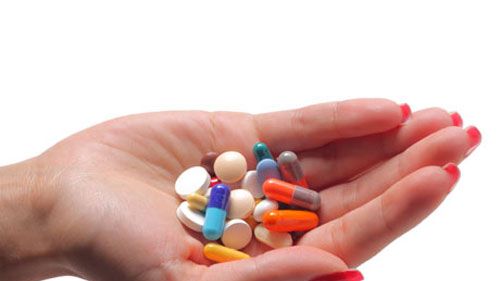Can a Pill Make You Smarter?
A series of new drugs promises to increase our productivity and focus.

I would have made the perfect poster child for the "Just Say No" campaign. Black coffee — lots of it — is my only vice. I militantly oppose tobacco, sleeping pills, and excessive alcohol. I assert a defiant Non! to marijuana, cocaine, and steroids (not that anyone has ever offered me any). Somehow, I made it through prep school and college among the most prudish of friends. To me, anyone who engaged in chemical enhancements was a slacker or a cheater, and most certainly someone I didn't know.
But then I discovered Smart Drugs. Crack for nerds.
Smart Drugs, or more precisely, cognitive enhancers, include a variety of controlled substances, available — if you insist on being legal about it — only by prescription. They include stimulants such as dextroamphetamine (sold as Dexedrine and Adderall) and methylphenidate (Ritalin, Concerta) for treating attention deficit hyperactivity disorder (ADHD). By mimicking the brain neurotransmitters norepinephrine and dopamine, stimulants leave you utterly consumed with the task at hand until mission accomplished. Then you're fired up to tackle something else, anything else, from organizing your sock drawer to grooming your cat.
Smart Drugs also include a class known as eugeroics, meaning "good arousal" — which, for a worker bee like me, means the sort of high one gets when the mind is so crystal clear that one is able to dash off half a dozen lucid memos to the boss before 8:30 a.m. The eugeroics modafinil and armodafinil (sold as Provigil and Nuvigil) treat narcolepsy and "excessive sleepiness" (ES) due to shift work and sleep apnea. But prescribed off-label, they've also been found effective for ES due to overbearing superiors, perfectionist tendencies, and not enough hours in the day. They work by inhibiting the brain chemicals that cause fatigue, which, in turn, energizes the brain circuits. The outcome is alertness and, according to recent studies, focus and short-term-memory enhancement. Some say they move you from one challenge to the next with more ease than caffeine — without the jitters.
According to a reader survey conducted by the scientific journal Nature, one in five respondents has used prescription cognitive enhancers for nonmedical purposes — that's 50 percent more than those who reported taking these drugs for their intended use! When asked whether these practices should be allowed, 86 percent of the 1400 surveyed answered yes. Apparently, while the chattering classes tsk-tsked the doping habits of pro athletes, those within their own circles — writers, designers, scientists, scholars — have been juicing up themselves, or secretly wishing they could.
In doing my own survey, I was introduced to the in-house counsel of a private equity firm. He works 14- to 20-hour days and juggles 20 projects simultaneously. Tired of working late without getting the work done by quitting time, he contacted a psychopharmacologist, who prescribed the stimulant Focalin. Now, he says, "I can sit and draft an agreement for the next few hours and never look up, not even to check e-mail."
The notion was enough to make me Just Say Yes.
Stay In The Know
Get exclusive access to fashion and beauty trends, hot-off-the-press celebrity news, and more.
Drugs often fuel the spirit of an era. And if weed fired up the hippies of the '70s and cocaine invigorated the high-rolling '80s, now cognitive enhancers are having their moment. Today, the nerds and thinkers and overachievers have earned the spotlight — Bill Gates, Al Gore, Samantha Power, sultry multitasker Angelina Jolie. Smart Drugs offer an assist as we strive to be like them.
I decide on Provigil because, I reason, with my 12- to 16-hour days, my ES is practically the result of shift work. Plus, unlike ADHD drugs, eugeroics have thus far proved to be nonaddictive. I snag a prescription, pop a 100 mg pill, and await the emergence of my inner Brontë sister.
Within an hour, things start getting interesting. I feel not simply alert but perky and, dare I say, sharp. I mail out a rebate form for my new cell phone, which normally would have been lost in the black hole of my in-box. I draw up an outline for a project due weeks later. Free from the usual late-morning restlessness, I continue down my to-do list until around 2 p.m., when I realize I should probably eat something. I don't necessarily feel smarter. But I do feel more organized and in control as I throw my efforts behind the odious tasks that I'd normally put off. And that's all I need to feel like a rock star.
My experience sounds typical, says Barbara Sahakian, Ph.D., a neuropsychologist at the University of Cambridge School of Clinical Medicine. "People are very attracted to these drugs," she says — particularly in today's distracting techno-culture, where we constantly flit from TV to text to IM to Web. "It's as if we're being trained to get bored."
Cognitive enhancers first caught Sahakian's attention a couple of years ago, when she felt sluggish before giving a lecture and a colleague offered her Provigil. That got her wondering: Who else keeps a stash? It turns out, quite a few people. One professor told her that he swallows a pill every two weeks, on days he reserves for working on "complicated thoughts." A musician pops one before talking to the press. It was Sahakian's letter to Nature about her findings, titled "Professor's Little Helper," that prompted the journal to conduct its own survey.
Unless a medal or multimillion-dollar sports contract is at stake, we don't see splashy headlines about chemical enhancers. ("Brain doping snags a 10 percent raise for financial analyst!" doesn't have quite the same provocative ring as a Tour de France champion on steroids.) Still, ethicists worry: Is using these drugs a form of cheating?
When poker player Paul Phillips told the Los Angeles Times that Adderall and Provigil helped him win an impressive (though still modest, compared to the A-Rods of the world) $2.3 million in his tournament career, there was no public outcry. But I couldn't help but be suspicious, even though he did insist he'd been diagnosed with ADHD, fair and square. When a student told me she earned a respectable B on a 12-page paper — after popping a pill at 11 p.m. and doing all her research and writing by 8 the next morning — I felt a bit miffed. Six cups of coffee never charged me up in the same way. Is the advantage just? And what about the kid on financial aid who would never be able to afford a pill at $10 a pop?
Nevertheless, when I myself took Provigil, it felt as legit as a double espresso.
Provigil's effects last from six to 12 hours, and my 8 a.m. dose steamrolled right into the afternoon. I was particularly impressed when I made a phone call to cancel the services of a minister who had kindly offered to perform my wedding ceremony. I had dreaded it for days — how to say no to a servant of God? — but when I had her on the phone, it was as if the heavens opened up and instilled in me fresh logic and vocabulary.
When I discovered that Smart Drugs were being targeted by the National Institute on Drug Abuse (NIDA), an agency that concerns itself with coke addicts and glue-sniffing adolescents, I felt wrongly accused. The institute recently issued a report citing that about 7 million Americans age 12 or older have used prescription drugs for nonmedical reasons. Prescriptions for stimulants rose from 5 million in 1991 to almost 35 million in 2007. As Peter Conrad, Ph.D., author of The Medicalization of Society and a Brandeis University sociology professor, points out, we are no longer a country of "pharmacological Calvinism," the notion that self-improvement through hard work is more righteous than through drugs. But there are clear caveats. "Stimulants, particularly Adderall, carry a risk for addiction," says NIDA director Nora D. Volkow, Ph.D. "Modafinil is too new for us to know the long-term effects. But there's always a risk without proper surveillance." The worst side effects (though rare) for these drugs include cardiac complications, severe skin rashes, even suicidal tendencies. And while today's prescription stimulants curb the adrenaline rush caused by the amphetamines of two decades ago (remember how nutty Alex P. Keaton got after taking another kid's speed-spiked diet pills?), all-nighter aftermaths still aren't pretty. Explains one user: "I'd be up all night and do well on my exam. But the come-down sucked. I just felt really weird, and I'd get very sweaty armpits."
Volkow's warnings made sense, but just saying no is tough when, in the reality you create for yourself, too much is on the line — a deadline that could make or break your career, a deal that could mean making the next mortgage payment. But the solution may hinge on a deeper issue, says University of Pennsylvania neurologist Dr. Anjan Chatterjee. Maybe the real problem is, "Is this a dysfunctional way of living? And how do you fix that?"
In a report last May, the Academy of Medical Sciences predicted that a crush of no fewer than 600 cognitive enhancers will descend on the market before the century is over. Already, pharmaceutical company Shire has created a less addictive form of Adderall for adult ADHD (wink, wink). And as researchers continue to improve treatments for Alzheimer's disease, students, lawyers, bankers — or those with "memory retention disorder," jokes Conrad — will be sure to experiment with them.
Perhaps the only factor keeping overachievers from OD-ing on Smart Drugs is that the body knows it has its own right of refusal. I ended my Provigil experiment after two tries because, as much as I welcomed the rush of productivity, I didn't like the upset stomach and nausea that came with it. I renewed my relationship with coffee and allowed myself a nap once in a while — though I can't promise that, should an emergency arise in the future, I won't Just Say Maybe.
-
 Queen Elizabeth Gave the Perfect Response When Pope Francis Presented Her With Priceless Gifts for Prince George
Queen Elizabeth Gave the Perfect Response When Pope Francis Presented Her With Priceless Gifts for Prince GeorgeThe late pope spared no expense when it came to treating the infant prince in 2014.
By Kristin Contino
-
 Want Healthier-Looking Hair? This Unexpected Beauty Product Might Be the Answer
Want Healthier-Looking Hair? This Unexpected Beauty Product Might Be the AnswerSkip the shampoos, glosses, and treatments.
By Marie Claire Editors
-
 Queen Elizabeth's Two-Ingredient Lunch Supposedly Helped Her Stay Healthy and Look Younger
Queen Elizabeth's Two-Ingredient Lunch Supposedly Helped Her Stay Healthy and Look YoungerThe late monarch was "not a foodie," but kept her meals simple and fresh.
By Kristin Contino
-
 Peloton’s Selena Samuela on Turning Tragedy Into Strength
Peloton’s Selena Samuela on Turning Tragedy Into StrengthBefore becoming a powerhouse cycling instructor, Selena Samuela was an immigrant trying to adjust to new environments and new versions of herself.
By Emily Tisch Sussman
-
 This Mutual Fund Firm Is Helping to Create a More Sustainable Future
This Mutual Fund Firm Is Helping to Create a More Sustainable FutureAmy Domini and her firm, Domini Impact Investments LLC, are inspiring a greater and greener world—one investor at a time.
By Sponsored
-
 Power Players Build on Success
Power Players Build on Success"The New Normal" left some brands stronger than ever. We asked then what lies ahead.
By Maria Ricapito
-
 Don't Stress! You Can Get in Good Shape Money-wise
Don't Stress! You Can Get in Good Shape Money-wiseFeatures Yes, maybe you eat paleo and have mastered crow pose, but do you practice financial wellness?
By Sallie Krawcheck
-
 The Book Club Revolution
The Book Club RevolutionLots of women are voracious readers. Other women are capitalizing on that.
By Lily Herman
-
 The Future of Women and Work
The Future of Women and WorkThe pandemic has completely upended how we do our jobs. This is Marie Claire's guide to navigating your career in a COVID-19 world.
By Megan DiTrolio
-
 Black-Owned Coworking Spaces Are Providing a Safe Haven for POC
Black-Owned Coworking Spaces Are Providing a Safe Haven for POCFor people of color, many of whom prefer to WFH, inclusive coworking spaces don't just offer a place to work—they cultivate community.
By Megan DiTrolio
-
 Where Did All My Work Friends Go?
Where Did All My Work Friends Go?The pandemic has forced our work friendships to evolve. Will they ever be the same?
By Rachel Epstein